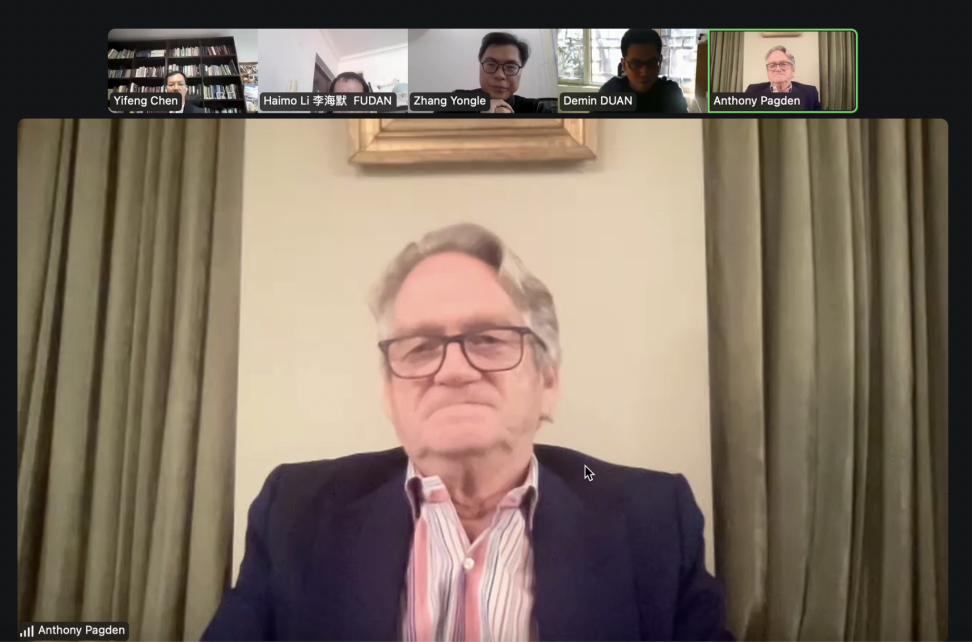
The 39th seminar of the “Adventus Amicorum” series hosted by the Institute of Area Studies, Peking University (PKUIAS), was held online on December 2, 2024. The keynote speaker for this event was Anthony Pagden, a distinguished professor of Political Science and History at the University of California, Los Angeles. Themed “Empire, Nation State and the Possibility of a New Global Order,” the session was moderated by Prof. Duan Demin at the School of Government, Peking University, and featured comments from Prof. Zhang Yongle, deputy director of PKUIAS, Associate Professor Chen Yifeng of Peking University’s Law School, and Associate Research Fellow Li Haimo of the School of International Relations and Public Affairs, Fudan University. More than 100 students and faculty members were in the audience.
In his speech, Prof. Pagden discussed empires, nation-states, and the future world order from both historical and future perspectives. First, he reviewed the history of empires and nation-states. For thousands of years, mankind did not live in the nation-states that people are familiar with today, but in large, multi-ethnic, multi-cultural, and for the most part multi-religious political complexes, which are often called “empires.” He noted that the empires had always been a more frequent, more extensive human experience than tribal territories or modern nations had ever been. Moreover, he emphasized that empires not only lasted longer than any other political forms, they also shaped the geographical pattern of the modern world. For example, Europe was the creation of the Roman Empire in the West, without which it would not have existed in any coherent or independent form at all. Prof. Pagden also stressed that the empire system began to unravel with the First World War, and the end of World War II marked the beginning of a new world order.
Second, Prof. Pagden suggested that the future world order would not be in the form of global empire or world government that often appeared in the past, nor would it be in the form of several competing global superpowers, but would be in the form of a global federation of states, a “Federation of Federations.” Prof. Pagden noted three reasons for his proposal: the increasingly internationalized living environment, divided national sovereignty, and global crises that demanded collective efforts (such as climate change, refugee issues, etc.). He emphasized that the future world order should be a world based on regional federations of states. To explore how the “Federation of Federations” order might be brought about, Prof. Pagden introduced Hans Kelsen’s discussion of international law to think about the possibility and necessity of a global judicial system.
During the discussion session, participants engaged in a lively and in-depth exchange with Prof. Pagden. Zhang Yongle proposed re-examining institutional forms such as the confederation from the perspective of political economy, Chen Yifeng raised questions about the form of international law and the foundation of the federal structure, and Li Haimo introduced the topic of natural law. Prof. Pagden responded positively to each of these discussions. In the end, Duan Demin summarized the seminar and expressed his hopes for further academic exchanges with Prof. Pagden to take place in the future.


